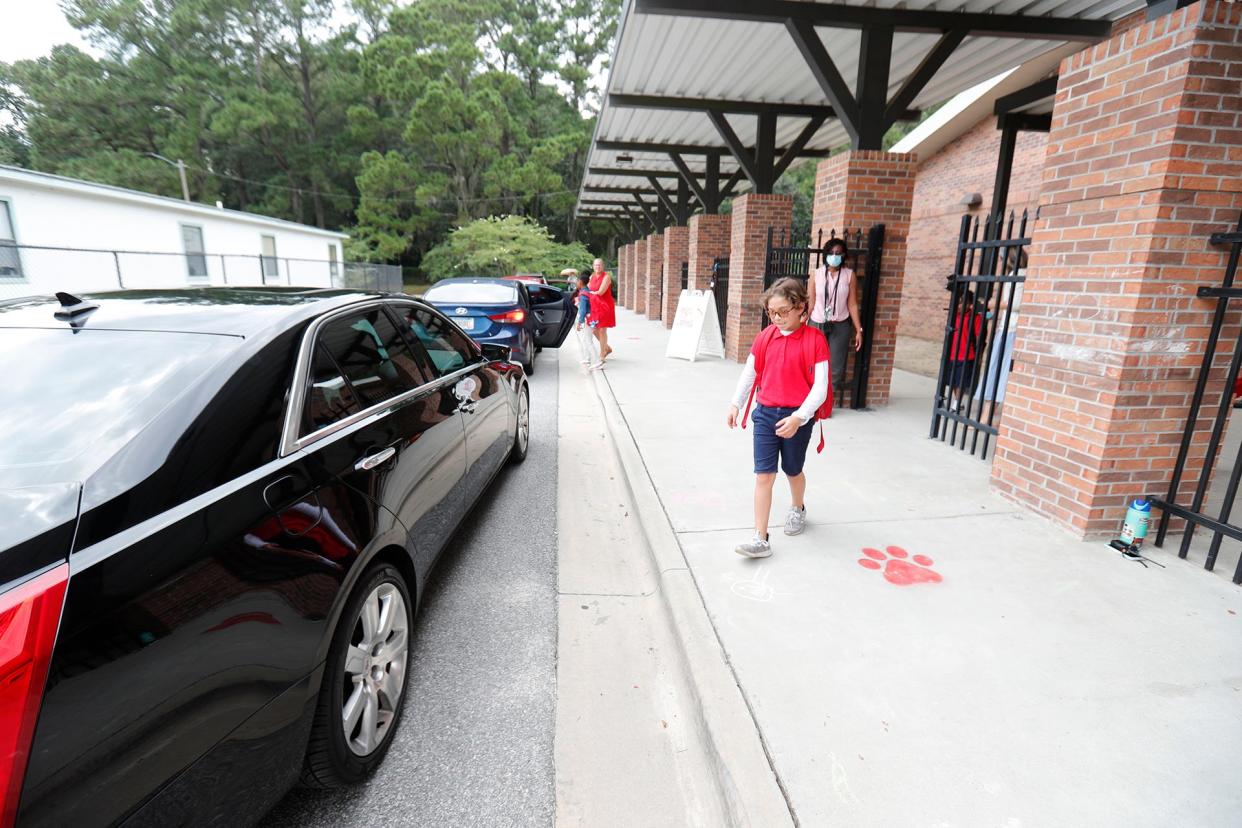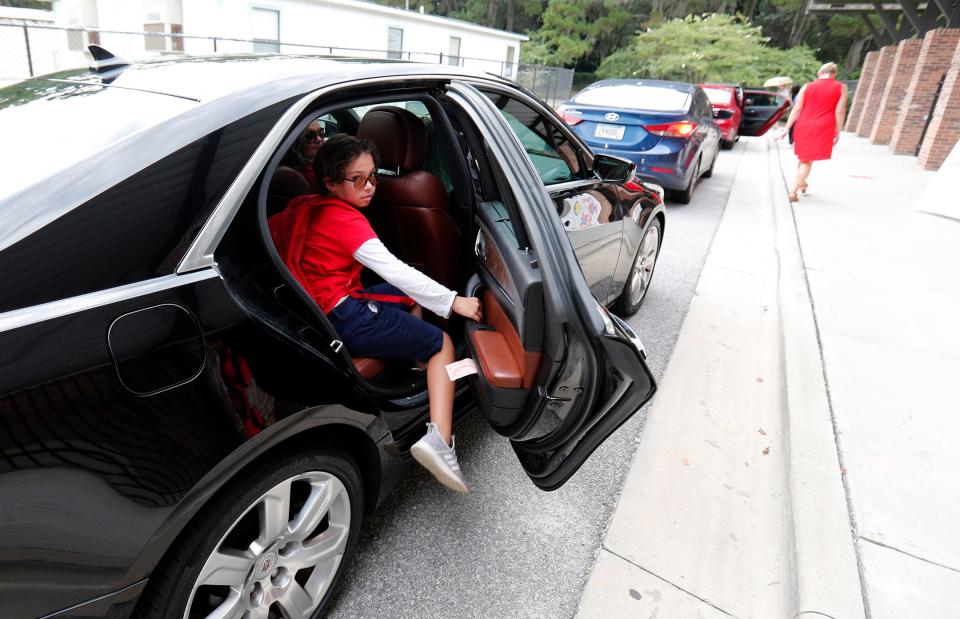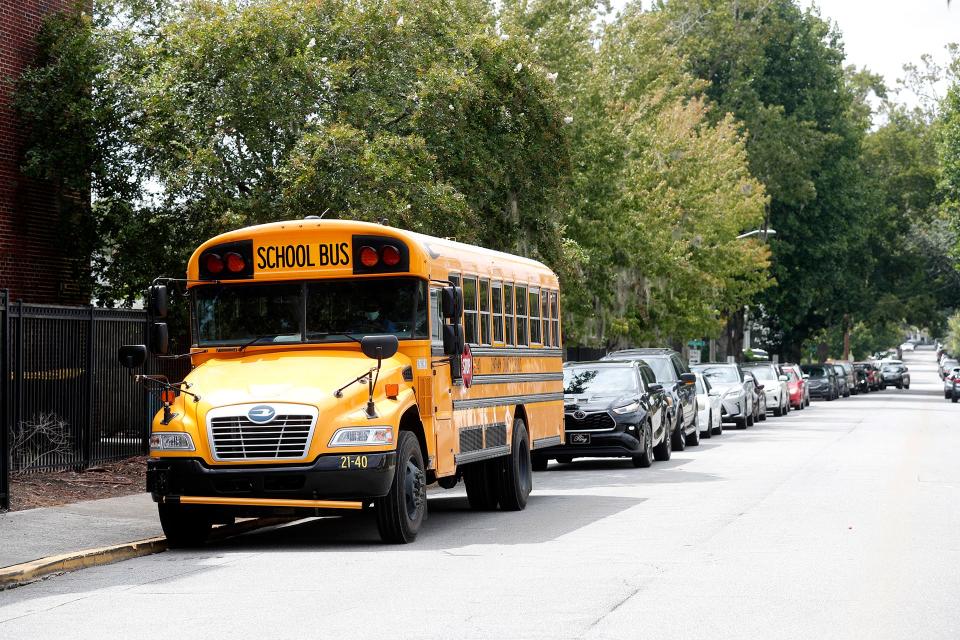SCCPSS bus driver shortage has parents scrambling for alternatives, again

Most of Kristen Dillard’s morning is spent carting her children to and from school: Her oldest child attends STEM Academy at Bartlett on Savannah's south side and has to be at school by 7:40 a.m. Dillard then has to double back home to start work before taking her youngest child to Largo-Tibet Elementary School, which has a start time of 9:15 a.m.
Dillard, who lives in Savannah’s Georgetown neighborhood in southwest Chatham County, estimated she spends about three hours on the road taking her children to and from school. While Dillard works remotely, the daily back and forth leads to her being late for work. She has an 8 a.m. start time.
"Thankfully, my employer is very understanding and flexible,” she said. “So, I do have the option to work later in the evening, but I'm still expected to make up that time within a day.”
What are choice programs schools in Savannah?

Dillard’s circumstances highlight the strenuous predicament parents have found themselves in since Savannah-Chatham County Public Schools again decided it will not provide transportation to students who attended choice programs schools. Choice schools offer Savannah students the opportunity to learn a specialty, such as STEM, aviation or the arts that may not be offered at their zoned school.
Students residing 1.5 miles or greater are eligible for transportation to their zoned school. Dedicated CHOICE schools do not have an attendance zone; therefore they are not eligible for transportation, a spokesperson for the district said.
The announcement was made in May, but by that time Dillard’s children were already accepted into their respective schools.

At the heart of this decision is SCCPSS’s bus driver shortage. At an August board meeting, the district reported being short 80 drivers for this school year. Overall, they are down more than 100 since their peak in the 2019-2020 school year.
As a result of the shortage, the school district has decided not to provide buses to children who attend choice schools, leaving parents scrambling to find options or wait it out in traffic like Dillard.
"It’s pretty much a part-time job transporting children back and forth every day,” Dillard said.
The ‘Figure It Out’ Method
SCCPSS’s bus drivers have steadily decreased since 2019 when the district employed had 328 drivers.
As of Aug. 15, the school district had hired 214 drivers with 18 of those drivers out on FMLA or worker’s compensation, district leaders reported Sept. 7, during an informal board meeting. The school district has lost between 30 and 45 drivers per year since 2019 due to payroll issues and COVID concerns. At the subsequent board meeting, the district reported eight bus drivers had resigned and another four were fired for job abandonment, mostly in July.
The driver shortage has led to school districts implementing what SCCPSS interim Director of Transportation Tammy Perkins said is being dubbed the FIO strategy: Figure it out. Perkins said she and other SCCPSS colleagues conferred with their counterparts across the state and found they were in similar positions.
“What we have found is that we’re all kind of doing the same thing,” Perkins told board members Wednesday.
To address the shortage, the school district is getting aggressive with its hiring.
Hiring has been a challenge in part because of pay: SCCPSS recently increased school bus drive salaries $2 in May. Starting bus drivers with a CDL license now make $17.88. A current job listing for bus driver operate has salary between $17.78 and $24.40.
Still, the district faces considerable competition from Chatham Area Transit, which pays a minimum hourly rate of about $17.39 to its bus operators as well as from the Georgia Port Authority, which also hire drivers with CDL license at approximately $18.71 an hour, according to Zip Recruiter.
Teamsters Local 728, who represents SCCPSS bus drivers, declined to comment for this story.
Pooler resident Holly E. Brinson-Tatum said she's worried pay isn't the only issue for drivers, and is also concerned about how the district is funding choice programs equitably for students.
"We have these awesome programs in our schools, and they should really be available to all students," said Brinson-Tatum, whose son attends Charles Ellis Montessori School in east Savannah, "and because we're not providing transportation, we are really limiting who gets to go and saying that it's only kids that are in a family that can have somebody pick them up or take them every day. And that is just not fair."
It is difficult to pinpoint how the shortage is affecting enrollment at choice schools, as the SCCPSS spokespersons said it does not keep data on withdrawals and the reasons for them at choice schools and programs.
The bus driver shortage also seeps into student pick-up and drop-off times. The school district has a targeted on-time performance rate of 97% but has only achieved roughly 72% for fiscal year 2022. Perkins noted the pandemic exacerbated the district's driver shortage and impacted the performance rate.
To mitigate the low rate, Perkins said field supervisors have assessed the 215 routes they had at the top of the year and eliminated six of them based on foot traffic at the stops. But even with that, the district still has 13 open routes because they simply don’t have enough drivers.
“We are able to cover, but means we’re using every single individual who is capable to operate those routes, (including) our mechanics.” Perkins said. “We have five of them who are operating a route every day.” Bus supervisors and a bus router have also been enlisted to help.
With more than 19,000 students assigned to routes, the school district has gotten more rigorous with its recruiting, such as convincing parents to become bus drivers and producing a commercial to recruit drivers.
The district also is holding job fairs at Hunter Army Air Field and Fort Stewart, with the hopes that retiring military will come work for the district.
Like other school districts, SCCPSSS received CARES Act and ARPA funds during the pandemic to address various needs including retention pay for teachers and learning loss. But of the more than $55 million CARES Act money the school district received, SCCPSSS spent a little more than $1.65 million on transportation PPE supplies and operations.
Earlier this year, the Georgia legislature approved $193 million to school districts for buses, safety incentives, and alternative fuel buses, “those type of things to assist districts (and) that burden off them, and they can put their focus on their employment piece of it,” said Mike Sanders, director of pupil transportation for the Georgia Department of Education.
Statewide Bus Driver Shortages
SCCPSS isn’t suffering alone: The bus driver shortage has rippled across other areas of the state, including larger metro-area school districts, such as DeKalb County School District and Fulton County Schools, which have reported experiencing shortages of 200 drivers.
“I think it has grown as a result of the pandemic, but it’s been a challenge for several years that school systems are dealing with,” said Sanders, who has been in his role since December 2021.
Sanders said school districts are not required by the state DOE to provide transportation to students, Sanders said. This means, the decision to not provide transportation to choice schools is at the discretion of the local district.
However, the GADOE does allow for school districts to contract with each other to provide transportation services. They also have consultants in regular contact with the school districts to help with issues they may have, chief among them being recruitment. Even though the state board of education does not require school districts provide transportation, most districts do, Sanders said.
For now, Brinson-Tatum and Dillard are using carpooling to assuage a situation they hadn't initially planned.
Dillard gets a brief reprieve some mornings when a neighbor offers to take her younger child to school. On Sundays, the two carve out a pick-up and drop-off schedule.
Brinson-Tatum also faced the challenge of getting her son to school and making it to work at 9 a.m. in Effingham County. A friend of Brinson-Taylor's has offered to take her son to school when she drops her children at theirs.
"I am making it work," she said. "It is killing me but I'm making it work."
Raisa is a watchdog and investigative reporter for the Savannah Morning News. Contact her at rhabersham@gannett.com.
This article originally appeared on Savannah Morning News: With bus driver shortage, SCCPSS sees competition from ports, CAT

